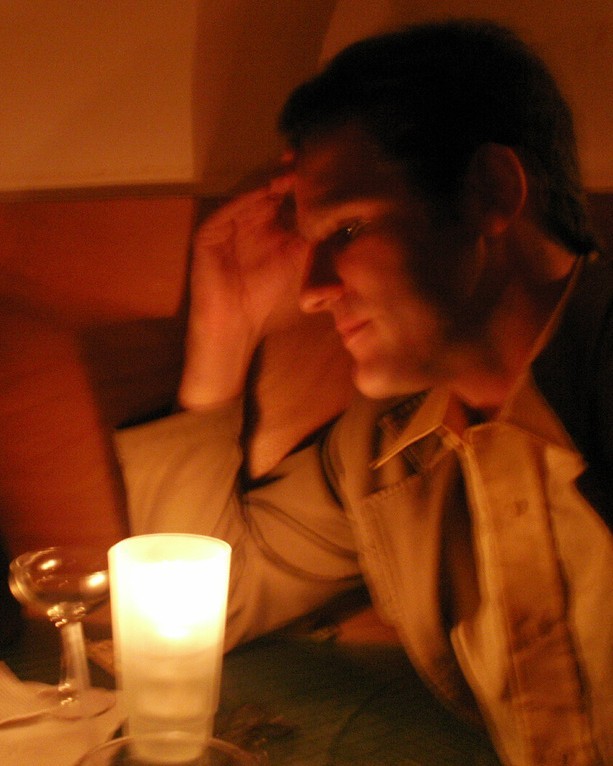Forty-some years ago, when I was a student at San Francisco State, Mark Linenthal, who then directed the Poetry Center there, and George Stanley, a student at the time, used to have a couple of running arguments about the nature of poetry. One of these concerned what a poem would consist of if it could be reduced to an absolute kernel. Image said Linenthal, while, as I recall, Stanley argued that the answer was sound.¹ The other had to do with the implications of a single word. Linenthal had said something to the effect that there was little real difference between “a” & “the” – poets got hung up on trying to make their poems perfect, which as often as not defeated the poem altogether.² George’s position was that the difference between “a” & “the” was so profound that you had two fundamentally different poems depending on which one you chose.
I hadn’t thought of those arguments for a long time until the other day when I was rereading Christian Hawkey’s Citizen Of, which I reviewed here a little over a year ago, & found myself thinking about the following poem long after I’d read it:
While You Were Out
I was here, inhabiting a room
& within the room I had
another room – my head – more empty
than the room I was in, since I
was in it, along with my cat,
who doesn’t believe in rooms
or closed rooms, doors.
I don’t either. But a door
was there & a door without a room
isn’t a door but a gate. It was a gate.
It had a hinge. It had two hinges.
It squeaked like a gate should squeak
when I opened it. It opened. It was a gate.
I was hungry for it to transform me,
moving through it, but it didn’t,
it just opened, & so I sat down
within it, holding either side of it
& it didn’t seem to mind it.
Reading the book this time around I remembered that something had given me the shivers almost at the very end of this poem. Rereading it, I realized that my first sense was that the work was exactly one word too long. At an important level, the terminal “it” adds no new content to what is already there & converts what could have been a very smooth conclusion into one that feels just a little bloated & clunky. Not that an extra word cannot add emphasis – Lew Welch’s great bit of market writing, one of the classic tag lines of 1950s advertising, does just this: Raid kills bugs dead. As distinct from any other way to kill them. But here the extra word means not only an extra beat, it allows the line to end on the hardest of closed consonants, d. The sound symbolism reinforces the content.
But Welch’s line also works because of the brevity of the text, something that Hawkey does not have going for him here. The extra “it” stands out like a pimple on the end of one’s nose. It (or perhaps “it”) reminded me of the argument between Mark & George 40 years ago. It also reminded me of a friend who often sends me drafts of works that in their early stages are almost invariably a little too long, as if the writer can’t quite believe they’ve finished the poem and never puts the brakes on in time.
Then I noticed something else. The word you appears once in the title – a line from a standard notepad that used to be commonplace in offices in the days before we each had our own voicemail archives – but nowhere in the poem. The word that jumps out visibly from the text, tho, is its polar opposite: I. I appears eight times in 18 lines. There are two other pronouns that are important here. One is me, which appears just once, at the end of the 14th line. The other is it, which appears 15 times, tho not once in the first four lines and just once in first nine. Which is to say that it appears 14 times in the last nine lines, including that terminal moment that jarred me so.
All of this is much too much to be accidental, like noticing the words with oo in their middle during the first half of the poem. Door & room, singular & plural, appear 11 times in the first ten lines, skipping just one line. Then neither word appears again for the remainder of the text.
So that rather than this text being one word too long, it is perhaps exactly the right length. I’m not sure that I would have noticed this play of pronouns had it not been for the blemish at the end, which took me back into the text, trying to figure out why. And what I come up with is a recognition that I’d been reading the poem one way, passively and discursively, when it was telling me all along that it needed to be read instead not as speech, but as construction. And rather than the tale of a gate, what I find instead is a tone poem, the ooze of door & room (whose double vowels do not add up to the same phoneme) giving way to the tinnier short eyes of it.
¹ History has shown both of these positions to be incomplete. The minimalism that began – virtually simultaneously with Linenthal & Stanley’s argument – with the work of Aram Saroyan in New York & later Robert Grenier demonstrated conclusively that poetry could not be reduced to “one thing.”
² With four decades hindsight, it occurs to me that an unspoken subtext of that debate might have been the poetry of Jack Gilbert, a mutual friend who was also on the faculty at State, and who resisted publishing, arguing that his poems were just drafts and were never sufficiently finished.






